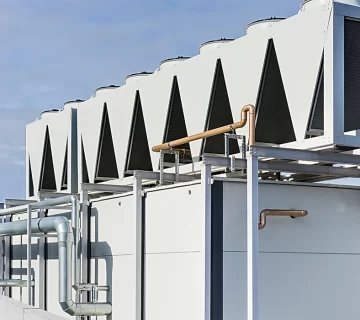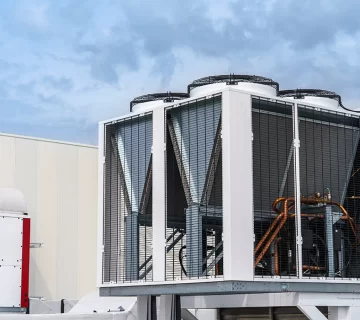Understanding Epoxy Coating for HVAC Chillers
HVAC chillers face a significant challenge with corrosion, which weakens their performance, efficiency and lifespan. One major method to protect them is to apply an epoxy coating that is a protective layer preventing rusting, wear and chemical damage. Epoxy coatings offer a long-term return on their investment in equipment durability for commercial buildings and industrial cooling systems alike with lots of smart opportunities.
Chiller service companies usually recommend epoxy coating for the protection of most important components such as tubing, water boxes, evaporators and so forth. Without this coating, combined moisture, chemicals and thermal gradients affect most of these components, resulting in very rapid deterioration, which in turn translates into increased chiller repairs and higher maintenance costs.
Role of Epoxy Coating in HVAC Chillers
Epoxy coating has a vital role to play in HVAC chillers where moisture and chemicals facilitate corrosion. This is how it functions:
Corrosion Protection – The epoxy coating creates a protective barrier against oxidation, rust and chemical reactions that drain metal surface strength.
Extended Equipment Life – By preventing wear and tear, it keeps the industrial chillers operating with minimal issues for decades.
Better Energy Efficiency – Corroded surfaces cause efficiency losses in heat exchange, and the system has to work harder to achieve the same result. The epoxy prevents this and improves system overall performance.
Reduced Maintenance Expenses – Chiller system maintenance costs less on a routine basis when components are not compromised and free from corrosion.
Protection from Harmful Chemicals – Cooling systems often have contact with chemicals that are corrosive to metal. Epoxy creates a protective cover, which is resistant to chemical attack.
These benefits are the reasons most businesses include epoxy coatings in their chiller preventive maintenance routine.
Benefits of Epoxy Coating in HVAC Chillers
Application of epoxy coating to HVAC chillers has numerous advantages apart from corrosion prevention.
1. Enhanced Performance
A corroded component in a chiller cannot offer efficient cooling. Epoxy coatings ensure smooth performance by preventing surface damage so that the system functions at peak performance.
2. Reduced Downtime
Periodic breakdowns cause downtime, affecting business operations. With epoxy-coated components, the risk of unexpected failure is eliminated, ensuring uninterrupted cooling. Chiller repair is less frequent, conserving time and resources.
3. Cost Savings
Replacement of corroded components can be expensive. Epoxy coating prolongs the life of existing components, reducing the rate of premature replacement and overall maintenance costs. Chiller system maintenance costs are significantly reduced in the long run.
4. Environmental-Friendly Solution
Epoxy coatings extend the life of industrial chillers, thereby fewer components end up in landfills. Additionally, increased efficiency equates to less energy usage, and it is more of an environmentally friendly solution.
5. Ease of Application and Flexibility
Epoxy coatings are easy to apply during chiller installation or as regular chiller preventive maintenance. Epoxy coatings eliminate the need for special surface preparation and can be developed based on the requirements of different cooling systems.
6. Microbial Growth Protection
Wet and rusted surfaces tend to become sites for meld and bacteria growth, which contaminates indoor air. Epoxy prevents microbial growth, promoting improved hygiene in cooling systems.
7. Ideal for Harsh Conditions
Chemical, high-humidity or extreme-temperature facilities, such as manufacturing units, are immensely benefited by using epoxy coatings. They provide a second layer of protection, helping HVAC chillers perform optimally under extreme conditions.
Conclusion
Epoxy coating would work as a magic bullet for HVAC chillers in terms of protection from corrosion, improved efficiency, along with decreased maintenance costs. It can be applied upon installing the chiller or it can be done by ongoing maintenance for longevity and reliability. Partnering with a trusted chiller service company will safeguard an effective application of this solution to enable businesses keep their cooling systems best for years.
Investing on epoxy coatings would help avoid chiller repairs, shorten downtimes and increase efficiency of the cooling system. When it comes to cost-effective solutions for the durability attribute enhancement in industrial chiller, an epoxy coating is an option to think about.
Frequently Asked Questions (FAQs):
What is epoxy coating, and how does it protect HVAC chillers?
Epoxy coating is a protective layer applied to metal surfaces inside HVAC chillers to prevent corrosion, chemical damage, and wear. It creates a strong, non-porous barrier that extends the life of chiller components.
Can epoxy coating improve the efficiency of industrial chillers?
Yes, epoxy coating prevents rust and scale buildup, which helps maintain optimal heat transfer and improves overall energy efficiency in industrial chillers.
Is epoxy coating applied during chiller installation or later?
Epoxy coating may be applied at chiller installation or may be continued later pursuant to ordinary maintenance to protect older components against further corrosion.
What parts of an HVAC chiller can be coated with epoxy?
Common areas for epoxy coating include condenser and evaporator tubes, water boxes and heat exchangers—components most exposed to water, chemicals and temperature fluctuations.
Does epoxy coating reduce HVAC chiller maintenance costs?
Yes, epoxy coated HVAC chillers experience a lower failure rate and repair events; therefore, resulting in lower chiller system maintenance costs over time.



